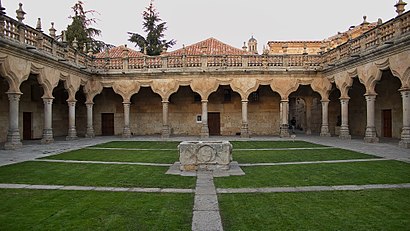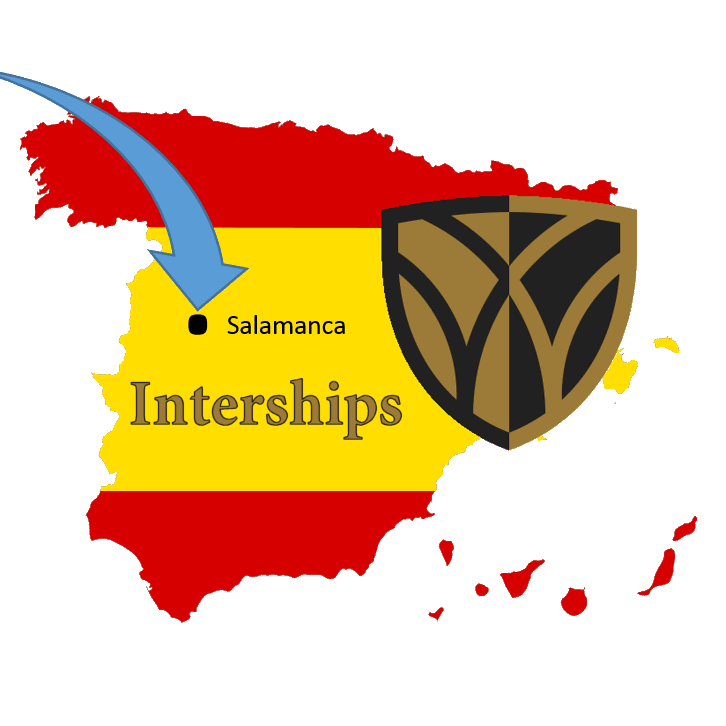Academics (internships)
Students in the program typically take one or two courses along with an internship. When two courses are taken, one of them is 303I, an internship-focused conversation course that counts as an elective towards the Spanish major/minor.

During two of the five weeks of the program, courses meet Monday through Thursday, leaving two three-day weekends for exploring the city or travel to other destinations.
| INTERNSHIP (Required) | + | 1 or 2 COURSES | ||
|---|---|---|---|---|
| INTERNSHIP (10.00AM-2.00PM) | + | COURSE 1 (5.00pm-6.30pm) | AND / OR | COURSE 2 (6.30pm-8.00pm) |
| A) SPA 199. Internship in Spanish Language (3h) B) SPA 391. Internship in Spanish for Business and the Professions. (3h) *Internships count 3h. towards graduation | SPA 303I. Language Study in the Context of an Internship (3h) Counts 3h. towards the major or minor | A) SPA 315. The Making of Spain: Interdisciplinary Approaches to the Cultures of Spain. (3h) Required for the Spanish major or minor B) SPA 319. Literary and Cultural Studies of Spanish America. (3h) Required for the Spanish major or minor C) SPA 313 Lights, Camera, ¡Acción!. Cinema and Culture in the Spanish-Speaking World (3h) Course availability depending on registration | ||
Course descriptions:
SPA 313. Lights, Camera, ¡Acción!. Cinema and Culture in the Spanish-Speaking World. (3 h) Traces the development of cinematic arts and industry, with special attention to signature movements, films, and directors and the representation of cultures on screen. P—SPA 280 or 290.
SPA 315. The Making of Spain: Interdisciplinary Approaches to the Cultures of Spain. (3 h) Examination of Spain’s cultural pluralism through visual arts, architecture, film, music, and literature from the medieval period to the present. P—SPA 280 or 290. (CD)
SPA 319. Literary and Cultural Studies of Spanish America. (3 h) Study of selected major works of Spanish-American literature within their historical and cultural contexts. Emphasis on linguistic and political structures, intellectual currents, art, music, and film to promote understanding of Spanish America's historical development. Offered only in WFU abroad programs. P-SPA 280 or 290. (CD)
SPA 391. Internship in Spanish for Business and the Professions. (3 h) Under faculty supervision, a student completes an internship in a bilingual business or professional setting. Does not count toward major or minor in Spanish. Pass/Fail only. P—SPA 309 or 309L; or POI.
Class changes once students have been registered for Salamanca courses are generally not permitted.
- An Add may be permitted if there is space in a class and the change will not enroll the student in more than 9 credit hours per summer term.
- A Drop will be permitted only in the event that the student has discovered an error on his/her transcript since registering for the program abroad and a different course is needed to meet major/minor/concentration requirements. (documentation required).
- Add/drop request form
The Salamanca Program follows the Class Attendance policy listed in the WF Bulletin:
- Regular attendance is vital in a language immersion program.
- While attendance is mandatory, in recognition of the fact that you may occasionally suffer minor illness or other conflicts, a maximum of two absences from classes, extracurricular activities, or academic trip days (whether partial or full) are permitted without any reduction in your grade.
- Each absence after the second will bring your attendance below 100% and will result in a decrease of two points on the final grade for the class.
- In the case of a documented hospitalization or serious prolonged illness or injury, the professor may provide accommodation. Send documentation of hospitalization / doctor’s multiple-day bed rest orders to your semester RP, who will communicate with your professors.
- Tardiness may be considered absenteeism.
- Internships require full participation through the last day of classes.
- Students missing 20% or more of total course hours may be removed from the course or the program (reviewed on a case-by-case basis).
- The grading scale in Salamanca is the same as the Spanish Department’s on Wake Forest Campus:
| 93-100 = A | 73-77 = C |
| A 90-92 = A- | 70-72 = C- |
| 88-9 = B+ | 68-69 = D+ |
| 83-87 = B | 63-67 = D |
| 80-82 = B- | 60-62 = D- |
| 78-9 = C+ | < 60 = F |

- Spanish universities follow a different calendar of assessment.
- Evaluations of class participation will take into account your class behavior and attitude (see class participation rubrics).
- Daily homework checks and quizzes are less common in Spanish university courses than in American ones. The norm is a midterm, a final, and several essays.
- Deadlines and times are firm. Late papers, presentations, missed exams, will be marked down 30% per day late.
- Changes will not be made to the final exam schedule.
- Assistance from tutors or other native speakers is permitted but they are not to help you do assignments to be turned in for a grade. Doing so will constitute an infraction of the Honor Code.
Throughout the semester you are bound to note cultural differences in your Salamanca professors´ styles of teaching. This is part of the experience of studying abroad. However, just as your professors on campus articulate their expectations clearly, provide you with timely feedback, and grade your work fairly, so also will your professors in Salamanca.
If at some point you should have a complaint about a professor’s performance or grading, use the following procedure:
- As soon as possible and no later than fifteen days after the event, talk personally with or send a written message explaining the concern directly to the professor. Should you need assistance writing this message, your Resident Professor may be of help. (If your complaint regards the Resident Professor, move directly to step 2) The Resident Professor will not take a position or write a message for you, but s/he can help you find the vocabulary to communicate your complaint.
- If your complaint is not resolved, you may appeal to the Program Director for assistance. The Program Director will communicate with you and the professor, seek to understand your individual perspectives, reach a conclusion, and share it with you and the professor.
- If your complaint is still not resolved by these procedures, you should consult with the Office of Academic Advising for assistance.
- Finally, you may appeal to the Committee on Academic Affairs which will study the matter, solicit input from all parties, and reach a final decision concerning resolution.
Again, a complaint should be directed as soon as possible to the professor whose actions or inactions have given rise to the problem. In no case will a complaint be considered later than fifteen days after the event.”
Honor Code

WFU Honor Code: https://studentconduct.wfu.edu/undergraduate-student-handbook-2/#20230228212512
Honor Code
The Wake Forest Undergraduate Honor Code prohibits “plagiarism, stealing, cheating, and deception.” In academic terms, this means turning in, as your own, wording, text, or ideas that are not your own.
To avoid plagiarizing, cite your sources when quoting, paraphrasing, or summarizing works (print or online) by other authors. To avoid cheating and deception, do not use tutors, friends, collaborators, contractors, translators, grammar checks, or artificial intelligence generators for work that must be your own.
Any sign of plagiarism, stealing, cheating or deception will be regarded as a violation of the Honor Code and will be awarded a grade of 0 and submission to the Judicial Council.
Wake Forest will pay for all your books. You will be notified when and where to collect them.
Find the link for your USAL Gmail account here http://gmail.usal.es/
- Your USAL account username will be your email address (example: i_c000000@usal.es; you can find yours below your picture on your USAL ID card).
- Your passport number will be your password.
- Use your USAL credentials to access the USAL Canvas, called STUDIUM can be accessed here with http://studium.usal.es/
Make sure that you log into your USAL account to activate it. It must be done at least once before classes start. Please let us know immediately if you are unable to log in.


